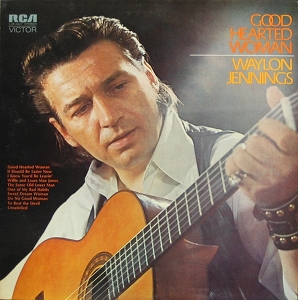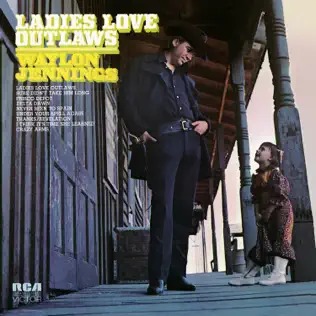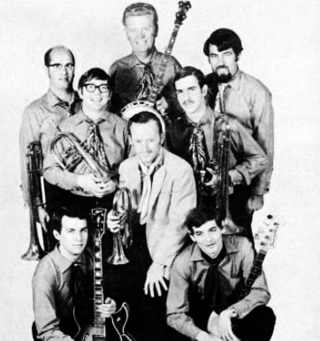
Chester Burton Atkins, also known as "Mister Guitar" and "the Country Gentleman", was an American musician who, along with Owen Bradley and Bob Ferguson, helped create the Nashville sound, the country music style which expanded its appeal to adult pop music fans. He was primarily a guitarist, but he also played the mandolin, fiddle, banjo, and ukulele, and occasionally sang.

Waylon Arnold Jennings was an American singer, songwriter, musician, and actor. He is considered one of the pioneers of the outlaw movement in country music.

The Taker/Tulsa is a studio album by American country music artist Waylon Jennings, released in 1971 on RCA Nashville. The LP rose to #12 on the Billboard country albums chart while the single "The Taker" was a Top 5 hit single.

Waylon Sings Ol' Harlan is a 1967 album by American country music artist Waylon Jennings, released on RCA Victor. It consists completely of songs by Harlan Howard.

Folk-Country is the major-label debut album by American country music artist Waylon Jennings, released in 1966 on RCA Victor. It is his first collaboration with producer Chet Atkins.

Leavin' Town is the second studio album by American country music artist Waylon Jennings, released in 1966 via RCA Victor. It peaked at #3 on the Billboard country albums chart.

Nashville Rebel is the third studio album by American country music artist Waylon Jennings, released in December 1966 via RCA Victor. It reached #4 on the Billboard country albums chart.

Hangin' On is a studio album by American country music artist Waylon Jennings, released in 1968 on RCA Victor.

Just to Satisfy You is a studio album by American country music artist Waylon Jennings, released in 1969 on RCA Victor.

Waylon is a studio album by American country music artist Waylon Jennings, released in 1970 on RCA Victor.

Singer of Sad Songs is a studio album by American country music artist Waylon Jennings, released in 1970 on RCA Nashville.

Good Hearted Woman is a studio album by American country music artist Waylon Jennings, released in 1972 on RCA Nashville.

Ladies Love Outlaws is an album by American country music artist Waylon Jennings, released on RCA Nashville in 1972. Together with Jennings' previous album Good Hearted Woman, it marks his transition toward his Outlaw Country image and style. "Ladies Love Outlaws" coined the use of the term "Outlaw" to refer to the country music subgenre, which was developing at the time of its release.

Lonesome, On'ry and Mean is a studio album by American country music artist Waylon Jennings, released on RCA Victor in 1973. It was, after Good Hearted Woman and Ladies Love Outlaws, the third in a series of albums which were to establish Jennings as one of the most prominent representatives of the outlaw country movement. Like its successor, Honky Tonk Heroes, the album is considered an important milestone in the history of country music. It represented the first of Jennings' works produced and recorded by himself, following his fight for artistic freedom against the constraints of the Nashville recording establishment.

Honky Tonk Heroes is a country music album by Waylon Jennings, released in 1973 on RCA Victor. With the exception of the final track on the album, "We Had It All", all of the songs on the album were written or co-written by Billy Joe Shaver. The album is considered an important piece in the development of the outlaw sub-genre in country music as it revived the honky tonk music of Nashville and added elements of rock and roll to it.

Dreaming My Dreams is the twenty-second studio album by American country music artist Waylon Jennings. The album was co-produced with Jack Clement and recorded at Glaser Sound Studios in Nashville, Tennessee, between February and July 1974.

Wanted! The Outlaws is a compilation album by Waylon Jennings, Willie Nelson, Jessi Colter, and Tompall Glaser, released by RCA Records in 1976. The album consists of previously released material with four new songs. Released to capitalize on the new outlaw country movement, Wanted! The Outlaws earned its place in music history by becoming the first country album to be platinum-certified, reaching sales of one million.

Danny Davis was an American country music band leader, trumpet player, vocalist and producer, best known as the founder and leader of the Nashville Brass. He is also famous for performing the English theme song of the anime series Speed Racer.
Chet Atkins' discography is large and diverse. Not only did he release principal studio albums as a solo artist, he was a prolific and much sought-after collaborator. He also played as a sideman on many more. His major collaborations were with Hank Snow, Arthur Fiedler and the Boston Pops Orchestra, The Country All-Stars, The Nashville String Band, Jerry Reed, Merle Travis, Doc Watson, Lenny Breau, Les Paul, Mark Knopfler, Suzy Bogguss, Floyd Cramer, Johnny Gimble, and Tommy Emmanuel. He frequently guested on a track or two with other friends. Several of his recordings won or were nominated for Grammy Awards.

"Just to Satisfy You" is a song written by American country music singers Waylon Jennings and Don Bowman in 1963. Jennings included the song in his performing repertoire, and on radio, where the song became a local hit in Phoenix, Arizona.



















